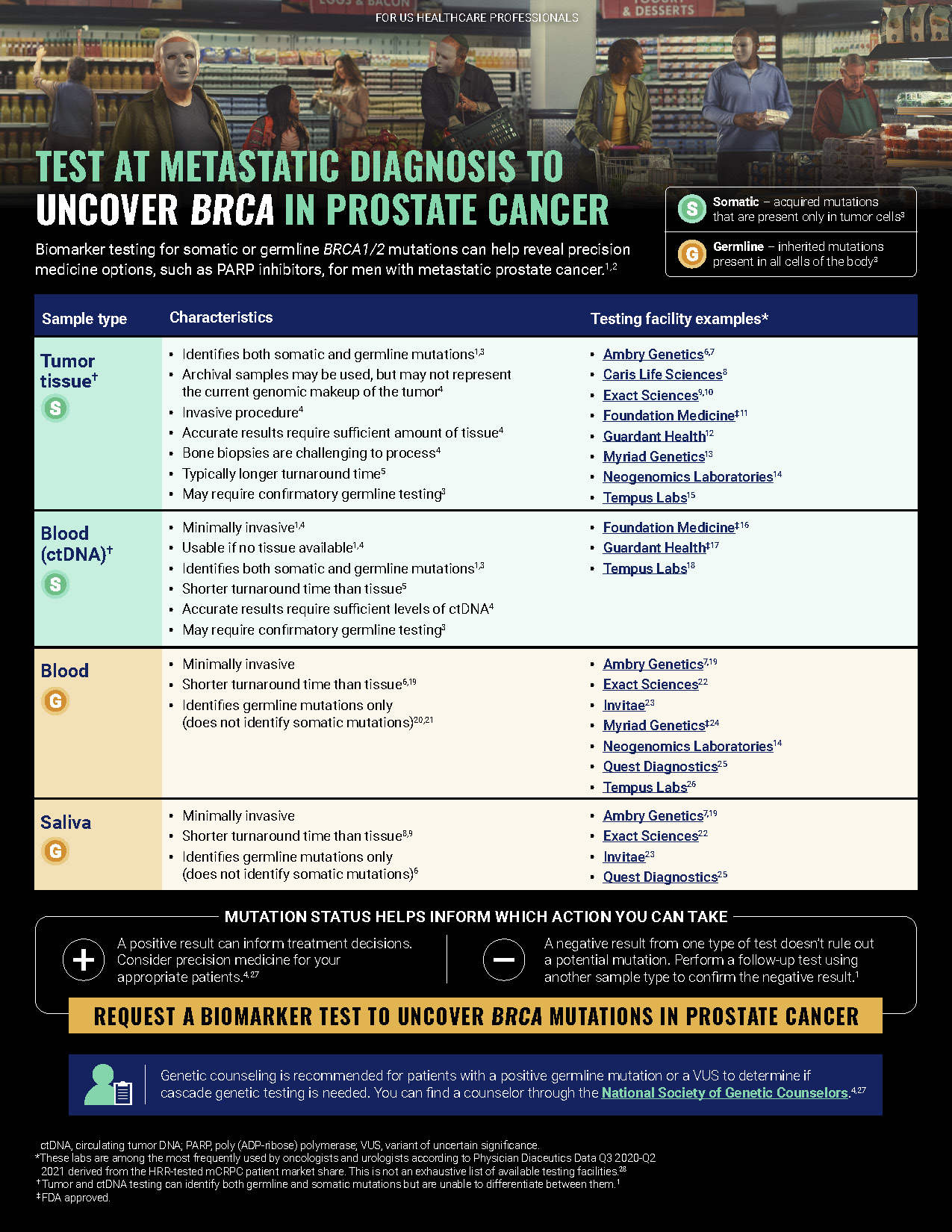
HRR mutations, including BRCA1/2, in your patients with metastatic prostate cancer can mean more aggressive disease and poorer prognosis, posing a greater need for precision medicine. These mutations often go unidentified in the first line, but early genetic testing makes it easier to uncover driver mutations in these patients to help inform their treatment plan.1-5
Uncover BRCA in
prostate cancer

BRCA1/2 MUTATIONS CAN DRIVE AGGRESSIVE mCRPC
BRCA1 and 2 mutations are among the most commonly occurring actionable alterations within mCRPC, with a combined rate of ~10%.5-10
Both germline and somatic BRCA1/2 mutations can be used to identify patients with potentially poorer prognosis, including shorter time to progression and worse overall survival.2,5,11,12
BIOMARKER TESTING CAN HELP REVEAL PRECISION MEDICINE OPTIONS FOR MEN WITH METASTATIC PROSTATE CANCER2,8

PRECISION MEDICINE CAN HELP OPTIMIZE OUTCOMES FOR BRCA+ PATIENTS WITH mCRPC4
mCRPC patients with HRR mutations, including BRCA1/2, can quickly develop resistance to a first-line novel hormonal therapy, the current standard of care.13,14
Men with BRCA2 mutations may face shorter prostate cancer-specific survival than those without11
In a multicenter prospective cohort study of 419 men with mCRPC, prostate cancer-specific survival was halved in those with germline BRCA2 mutations (17.4 vs 33.2 months; P=0.027).11
SOMATIC AND GERMLINE BRCA1/2 MUTATIONS ARE VULNERABLE TO PARP INHIBITION THROUGH SYNTHETIC LETHALITY8

TEST AT METASTATIC DIAGNOSIS TO TREAT WITH PRECISION15
It is now recognized that biomarker testing may help create individualized treatment strategies in prostate cancer. Testing to identify somatic and germline BRCA gene mutations may be informative for guiding treatment decisions and determining clinical trial eligibility.15,16
NCCN CLINICAL PRACTICE GUIDELINES IN ONCOLOGY (NCCN GUIDELINES®) RECOMMENDED
The NCCN Guidelines® recommend both somatic and germline testing for HRR mutations, including BRCA1/2, in all patients with metastatic prostate cancer.15
Although PARP inhibitors have demonstrated efficacy among patients with HRR mutations such as BRCA1/2, only ~38% of mCRPC patients undergo biomarker testing for these mutations.4
-

Germline mutations are inherited pathogenic variants that are present in all cells of the body. These mutations can be identified via liquid assay biomarker testing (blood or saliva)8,17

Somatic, or acquired, mutations can only be identified via tumor-based testing (tumor sample or ctDNA). Tumor-based testing does not distinguish between germline and somatic mutations8,17

Follow-up germline testing and genetic counseling are recommended to identify possible implications for inherited cancer predisposition for any patients found to have clinically meaningful mutations via tumor-based testing17

Biomarker testing may benefit a patient’s biological family members. Those harboring germline BRCA1 or 2 mutations are 3.4 or 8.6 times more likely, respectively, to develop prostate cancer than those without either mutation, and are also at greater risk of developing breast or ovarian cancer12,18
BIOMARKER TESTING AT METASTATIC DIAGNOSIS IS CRUCIAL TO HELP OPTIMIZE TREATMENT OUTCOMES3

Biomarker testing
laboratory resource
Explore the differences between tumor tissue, ctDNA, blood, and saliva testing and view laboratory options that offer BRCA testing.


Exclusive video series
Sit back, relax, and watch these prostate cancer experts discuss the value of early biomarker testing and precision medicine in mCRPC.
Visit video hub

